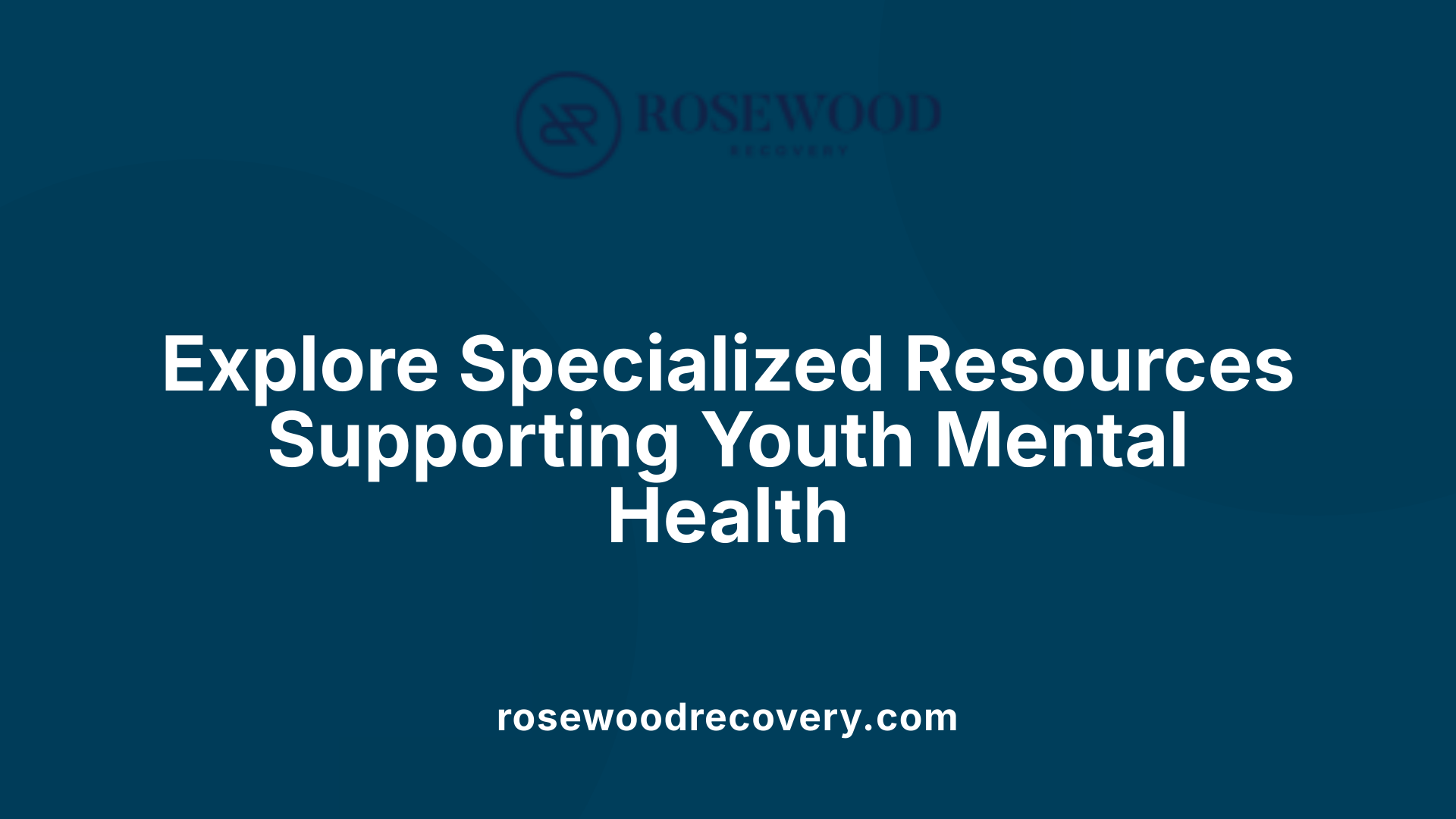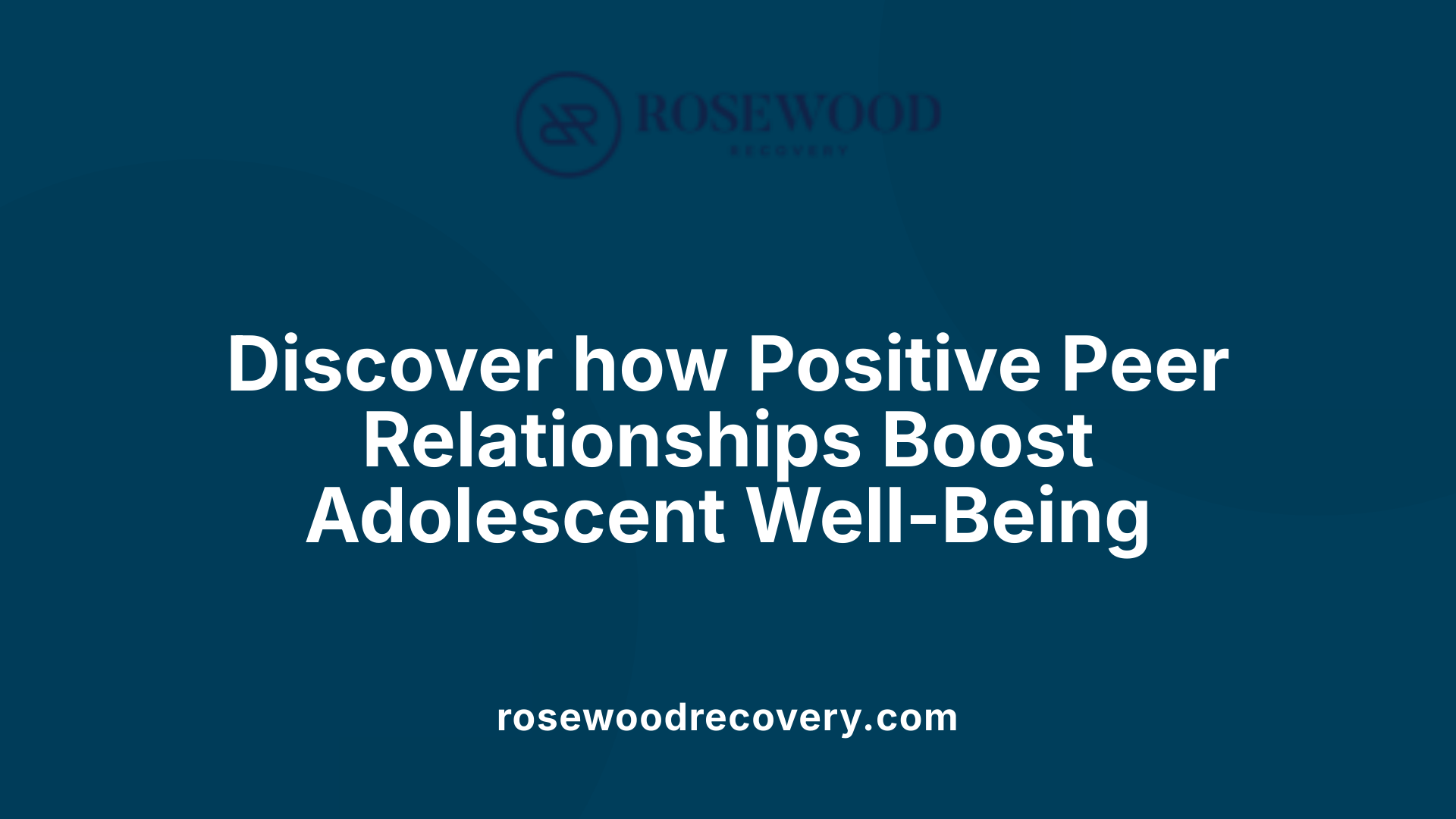Fostering Healthy Peer Relationships in Adolescent Development
Positive peer interactions are vital during adolescence, shaping social-emotional growth, mental health, and future well-being. In Pennsylvania, a spectrum of adolescent services emphasizes nurturing these relationships through evidence-based programs, community involvement, and supportive environments. This comprehensive approach recognizes the unique developmental needs of youth and seeks to equip them with skills, resources, and trusts needed for healthy peer engagement, ultimately contributing to resilient, confident, and socially capable individuals.
Holistic Support through Specialized Behavioral Health Services

What resources are available to support adolescent mental health and promote positive peer interactions?
There are numerous specialized resources designed to support the mental and emotional well-being of adolescents. The Center for Child & Adolescent Behavioral Health (CBI) stands out as a primary provider of comprehensive, family-centered care. CBI addresses a broad spectrum of behavioral health issues such as anxiety, depression, trauma, ADHD, and peer difficulties, offering a safe environment where young individuals can access high-quality treatment.
In addition to outpatient services, CBI offers specialized therapy groups tailored to various needs. These include Mindfulness, Communication and Leadership, Emotional Regulation, and LGBTQ+ support groups. These programs aim to enhance emotional regulation, foster understanding, and promote peer acceptance and community integration.
For adolescents with severe behavioral challenges, inpatient units provide structured, multidisciplinary care. These units include therapeutic groups focused on social skills, anger management, art therapy, and education. The structured environment helps youth develop important life skills, cope with emotions, and rebuild positive peer relationships.
Peer support services also play a vital role. Run by trained and certified individuals who have personal experience with behavioral health, these services promote empowerment, understanding, and resiliency. They facilitate mentoring and service coordination, helping adolescents navigate their mental health journeys while strengthening peer connections.
Overall, these resources combine therapy, peer support, and inpatient care to foster resilience, recovery, and healthy peer interactions among adolescents.
What programs and support groups aimed at fostering positive peer relationships among adolescents in PA?
Pennsylvania offers a variety of programs to cultivate positive peer relationships. Peer Support Services (PSS) involve trained individuals—current or former consumers of behavioral health services—who provide mentorship and guidance, encouraging empowerment and self-determination.
Therapeutic group programs specifically focus on developing social-emotional skills. The Emotional Regulation group, for example, teaches adolescents the five steps of managing emotions—identifying feelings, calming down, making choices, and solving problems. Such training addresses issues like bullying, anxiety, and depression, aiding teens in forming healthier relationships.
Support groups for LGBTQ+ youth are also available to address issues of discrimination, mental health, and advocacy, fostering acceptance and resilience.
Family involvement is reinforced through Parent Processing Groups targeted at parents of 11-14 year-olds. These groups provide a space for parents to share experiences, process feelings, and learn strategies for supporting their children’s mental health.
Together, these programs nurture social confidence, improve peer interactions, and reduce barriers to healthy relationship development.
Building Skills through Evidence-Based Programs and Strategies

What evidence-based approaches are effective in understanding and improving peer relationships among adolescents?
Developing healthy peer relationships during adolescence is vital for social and emotional development. Evidence-based approaches such as social-emotional learning (SEL) programs have shown significant positive impacts. Programs like PATHS and Second Step focus on teaching empathy, effective communication, conflict resolution, and emotional regulation. These curricula are delivered through classroom lessons that encourage positive social interactions.
Peer mentorship initiatives are also highly effective. Mentors—often older or trained peers—serve as role models, guiding younger adolescents in navigating peer dynamics and fostering respectful interactions.
Structured programs like the Peer Relationship Enhancement Program specifically address online addiction, cyberbullying, and interpersonal challenges. By emphasizing trust, respectful dialogue, and mutual understanding, these strategies promote healthier peer environments. Incorporating culturally responsive frameworks further enhances the effectiveness, ensuring inclusivity and respect for diverse backgrounds.
Overall, these interventions focus on building social skills, fostering trust, and creating respectful communication environments that nurture positive peer relationships.
What programs and interventions promote social skills development?
School-based social skills training is foundational for fostering acceptance and connectivity among students. These programs often involve skill-building activities that teach appropriate ways to interact, manage emotions, and resolve conflicts. For example, integrating mental health programs and targeted therapies helps at-risk youth develop resilience and social competence.
Community initiatives also play a crucial role. These might include social clubs, sports, or extracurricular activities that promote teamwork, leadership, and social bonding.
Family involvement in social skill development can further reinforce these skills outside school. Parents and caregivers engaging in conversations about emotions, respect, and problem-solving support social acceptance and emotional regulation.
Combining school-based programs with community and family initiatives creates a comprehensive approach. This multi-layered strategy ensures that youth develop lasting, positive peer relationships, supported by a network of skills, understanding, and inclusive practices.
| Program Type | Focus Area | Implementation Example | Additional Notes |
|---|---|---|---|
| SEL Programs (e.g., PATHS, Second Step) | Empathy, communication, conflict resolution | Classroom lessons, role-playing | Evidence-based, classroom-centered |
| Peer Mentorship | Peer support, trust building | Trained peer mentors working with younger students | Promotes leadership and positive norms |
| Social Skills Training | Emotional regulation, cooperation | School workshops, community programs | Enhances social network and acceptance |
| Family Engagement Programs | Parental support, reinforcement | Family workshops, parent-child activities | Strengthens at-home social skills |
These strategies collectively foster social-emotional skills, promote inclusion, and build healthier peer interactions—integral to adolescent well-being and resilience.
Creating Inclusive Environments for Diverse Youth

What frameworks support inclusive and supportive social environments for adolescents with diverse needs?
Promoting an inclusive and supportive atmosphere for all youth, especially those with diverse needs, relies on well-established frameworks. The Collaborative for Academic, Social, and Emotional Learning (CASEL) provides a foundation through its emphasis on social-emotional learning (SEL). This approach encourages self-awareness, social understanding, and responsible decision-making, fostering empathy and respect among varied groups.
Programs like Teens for Social Inclusion (T4SI) specifically target peer mentorship and aim to reshape social norms about disability and difference. These initiatives promote positive perceptions and encourage young people to see diversity as a strength rather than a barrier.
Furthermore, UNICEF's human rights-based approach advocates for participation and empowerment, ensuring adolescents of all backgrounds can safely and respectfully engage in their communities. This approach emphasizes creating environments where every young person feels valued and has equal opportunity to thrive.
| Frameworks/Programs | Focus Areas | How They Support Inclusion |
|---|---|---|
| CASEL | Social-emotional skills | Fosters empathy, understanding, and responsible decisions among diverse youth |
| Teens for Social Inclusion (T4SI) | Peer mentorship and social norms | Encourages positive perceptions of differences and promotes peer-led inclusion |
| UNICEF Human Rights Approach | Participation and empowerment | Ensures safe, respectful, and equitable engagement for all youths |
How can schools and communities foster inclusivity?
In educational settings and wider communities, fostering inclusion involves tailored strategies that address specific needs while promoting a culture of acceptance. Schools can implement inclusive curricula that reflect diverse experiences and training paraeducators to support peer interactions, especially for students with complex or special needs.
Engaging families and community organizations extends support networks beyond the classroom, creating a more comprehensive environment of acceptance. Awareness campaigns and activities led by peers can challenge harmful stereotypes and normalize diversity.
Encouraging peer-led initiatives, such as buddy systems or inclusive clubs, helps build understanding and empathy. Overall, these efforts contribute to an atmosphere where every adolescent feels supported, respected, and empowered to participate fully in social life.
| Strategies for Fostering Inclusion | Focus Area | Benefits |
|---|---|---|
| Tailored interventions and curricula | Education | Promotes understanding and engagement for diverse learners |
| Training paraeducators | Support | Enhances peer interaction and reduces social barriers |
| Family and community engagement | Support networks | Broadens acceptance and supports diverse needs |
| Awareness campaigns and peer-led activities | Culture change | Builds empathy and normalizes diversity |
Understanding and applying these frameworks and strategies are essential steps toward nurturing inclusive environments where all adolescents can flourish.
The Impact of Peer Relationships on Health and Well-Being

How does peer relationship quality affect adolescent health and well-being?
Strong peer relationships are vital during adolescence as they provide emotional support, build social skills, and foster a sense of belonging. When teens form positive friendships, they experience increased resilience and better mental health outcomes.
Good peer support helps buffer stressful situations, reducing the likelihood of emotional issues such as anxiety or depression. Conversely, negative peer experiences like rejection, bullying, or conflict can elevate risks for behavioral problems and emotional distress.
Research shows that supportive peer interactions, especially when combined with a healthy family and school environment, contribute to overall well-being and lifelong resilience. Adolescents who feel connected to their peers tend to develop better social competence, higher self-esteem, and healthier habits.
Supporting the development of positive peer relationships is crucial, as these bonds influence mental health, social growth, and even academic success. Initiatives like social-emotional learning programs and inclusive activities foster these supportive networks, helping young people navigate adolescence more securely.
Understanding the profound impact of peer relationships emphasizes the importance of creating safe, inclusive settings in schools and communities. Such environments can promote positive interactions and mitigate risk factors, ultimately improving adolescent health and well-being.
If you want to learn more, searching 'peer relationship impact adolescent health PA' offers extensive insights into this critical developmental area.
Prevention and Early Intervention: Reinforcing Peer Support

What prevention and intervention programs address youth mental health and suicide?
School and community-based initiatives play a vital role in supporting youth mental health and preventing suicide. Programs such as peer counseling, wellness ambassador initiatives, and the creation of safe spaces within educational settings promote positive peer relationships and early intervention.
Training programs like BRSS TACS focus on developing youth-led support networks, empowering young people to assist their peers effectively. These programs provide teens with tools to recognize signs of emotional distress and guide them toward appropriate resources.
Comprehensive suicide prevention strategies often include peer components, emphasizing the importance of fostering an environment where mental health is openly discussed, and seeking help is normalized. By integrating peer support training, schools aim to enhance resilience among students and create safer, more supportive atmospheres.
Such initiatives are crucial in fostering early identification of emotional struggles and building a community of support that can help reduce stigma and encourage help-seeking behaviors among youth.
Strengthening Foundations for Youth Success
Pennsylvania’s adolescent services prioritize fostering positive peer interactions through specialized supports, inclusive frameworks, and evidence-based strategies. By integrating school, community, and family efforts, these initiatives build a resilient and connected youth population capable of navigating social challenges, promoting mental health, and developing lifelong social-emotional skills. Continual investment and collaboration are essential to nurturing environments where every adolescent can thrive socially, emotionally, and psychologically.
References
- Center For Child & Adolescent Behavioral Health
- Peer Support Services | Department of Human Services
- Child and Adolescent Outpatient Groups - Pennsylvania ...
- Child & Adolescent Behavioral Health Inpatient Services
- Positive Youth Development Resources
- Family Support Programs | Department of Education
- With A Little Help from My Friends:
- Peer relations: Prevention and intervention programs
- With a Little Help from My Friends
- Healthy Relationships in Adolescence




